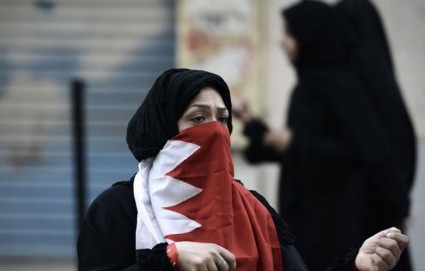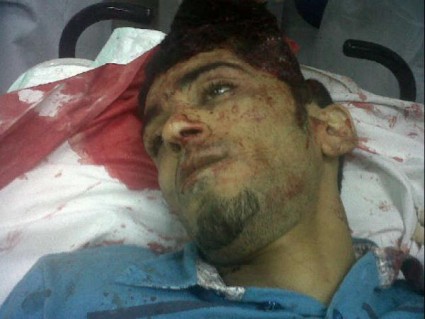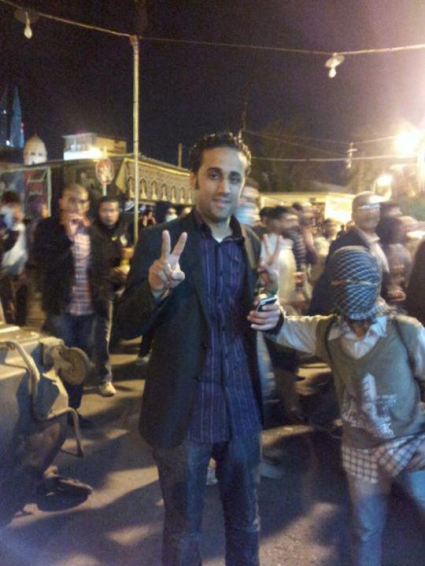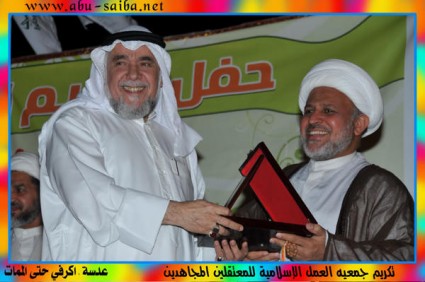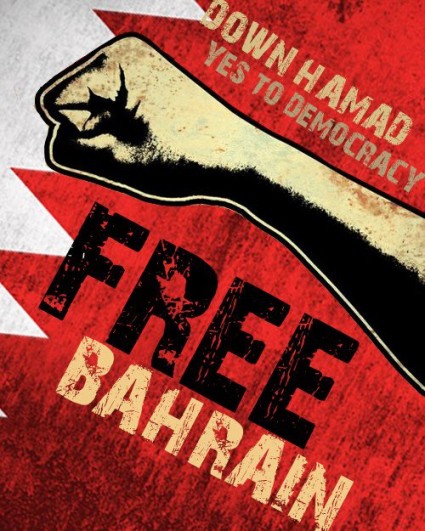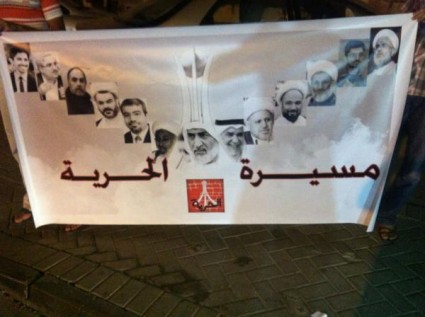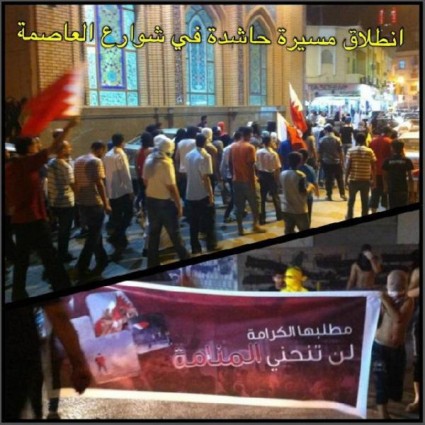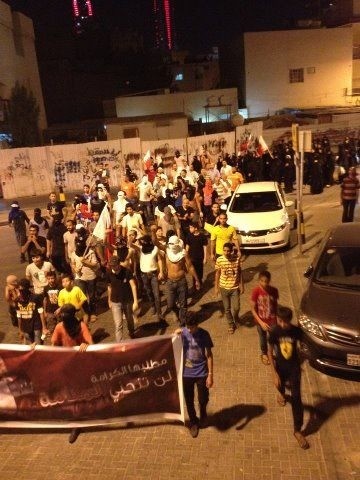Zainab Alkhawaja – For the Love of Bahrain for the Love of Freedom #FreeZainab
December 21, 2013 No Comments
Bahrain – Democracy Exiled and in Chains
Bahrain’s Activists Survive Off the Island
By: Marc Abizeid – Al Akhbar – 18 December, 2013
On-the-ground sources are running out fast in Bahrain. Those who have not been locked up or tortured for opposing the ruling monarchy are finding themselves with no option but exile.
Thirty-one-year-old Yousif al-Muhafda is the latest activist to join the growing list of asylum seekers to flee Bahrain – ruled by the Khalifa family since their 1783 invasion of the Gulf archipelago brought the tribesmen to power.
Two weeks ago Muhafda wrote a letter from Europe announcing he would not be returning home after receiving a barrage of death threats, following the launch of a campaign that publicly outed officials involved in the torture and killing of prisoners.
“The son of the king can go on TV and threaten protesters, and officials can send death threats under their real names and photos, and they feel confident that they won’t be held to account.”
The most alarming threat came from Adel Fleifel – a former security official notorious for corruption and torture – who, in thinly veiled terms, called for the father of two to be killed in a tweet earlier this month.
“This is what we mean when we talk about the culture of impunity in Bahrain,” Muhafda told Al-Akhbar.
“The son of the king can go on TV and threaten protesters, and officials can send death threats under their real names and photos, and they feel confident that they won’t be held to account.”
Documenting crimes
With short curly hair and long, neatly trimmed sideburns that curve down past his earlobes, Muhafda looks more like an aspiring pop star than a local champion for human rights, now widely recognizable across Bahrain.
Muhafda was the eyes and ears of the popular revolt which broke out on February 14, 2011 to demand political reforms and an end to the Khalifa dynasty’s concentration of wealth and power.
As head of the documentation unit at the Bahrain Center for Human Rights (BCHR), he closely monitored the ensuing (and ongoing) regime crackdown on dissidents which has left about 90 civilians dead in an island kingdom of 1.2 million, half of whom are migrant workers and other foreigners.
Unable to contain the movement, Bahrain’s regime ushered in a Saudi-led Gulf force a month after the uprising began in a bid to crush it. The move was quietly supported by the United States which continued to send arms to Bahrain, home to the US Fifth Fleet.
For almost three years Muhafda traversed from village to village, interviewing people who had been harassed, beaten, shot, and had their homes raided and ransacked by regime forces. With mounting evidence in hand, he shared an endless stream of photographs, videos, and reports implicating the kingdom’s ruling family in violations of human rights to his nearly 100,000 followers on Twitter.
Since the 2011 revolt he has been arrested seven times, and collectively spent about eight weeks in prison for documenting violations. …more
December 21, 2013 No Comments
American Exceptionalism allows it to back horrible regimes that murder, rape, torture, extort
Kissinger and Chile: In an Age of Vigilantes, There Is Cause for Optimism
19 September, 2013 – By John Pilger – Truthout
The most important anniversary of the year was the 40th anniversary of September 11, 1973 – the crushing of the democratic government of Chile by Gen. Augusto Pinochet and Henry Kissinger, then US secretary of state. The National Security Archive in Washington has posted new documents that reveal much about Kissinger’s role in an atrocity that cost thousands of lives.
In declassified tapes, Kissinger is heard planning with President Richard Nixon the overthrow of President Salvador Allende. They sound like Mafiosi thugs. Kissinger warns that the “model effect” of Allende’s reformist democracy “can be insidious.” He tells CIA director Richard Helms, “We will not let Chile go down the drain,” to which Helms replies, “I am with you.” With the slaughter under way, Kissinger dismisses a warning by his senior officials of the scale of the repression. Secretly, he tells Pinochet, “You did a great service to the West.”
I have known many of Pinochet’s and Kissinger’s victims. Sara De Witt, a student at the time, showed me the place where she was beaten, assaulted and electrocuted. On a wintry day in the suburbs of Santiago, we walked through a former torture centre known as Villa Grimaldi, where hundreds like her suffered terribly and were murdered or “disappeared.”
Understanding Kissinger’s criminality is vital when trying to fathom what the US calls its “foreign policy.” Kissinger remains an influential voice in Washington, admired and consulted by Barack Obama. When Israel, Saudi Arabia, Egypt and Bahrain commit crimes with US collusion and weapons, their impunity and Obama’s hypocrisy are pure Kissinger. Syria must not have chemical weapons, but Israel can have them and use them. Iran must not have a nuclear program, but Israel can have more nuclear weapons than Britain. This is known as “realism” or realpolitik by Anglo-American academics and think-tanks that claim expertise in “counterterrorism” and “national security,” which are Orwellian terms meaning the opposite.
In recent weeks, the New Statesman has published articles by John Bew, an academic at the Kings College war studies department, which the cold warrior Laurence Freedman made famous. Bew laments the parliamentary vote that stopped David Cameron joining Obama in lawlessly attacking Syria and the hostility of most British people to bombing other nations. A note at the end of his articles says he will “take up the Henry A. Kissinger Chair in Foreign Policy and International Relations” in Washington. If this is not a black joke, it a profanity on those like Sara de Witt and Kissinger’s countless other victims, not least those who died in the holocaust of his and Nixon’s secret, illegal bombing of Cambodia.
This doctrine of “realism” was invented in the US following the second world war and sponsored by the Ford, Carnegie and Rockefeller Foundations, the OSS (forerunner of the CIA) and the Council on Foreign relations. In the great universities, students were taught to regard people in terms of their usefulness or expendability: in other words, their threat to “us.” This narcissism served to justify the Cold War, its moralizing myths and cataclysmic risks and, when that was over, the “war on terror.” Such a “transatlantic consensus” often found its clearest echo in Britain, with the British elite’s enduring nostalgia for empire. Tony Blair used it to commit and justify his war crimes until his lies got the better of him. The violent death of more than 1,000 people in Iraq every month is his legacy; yet his views are still courted, and his chief collaborator, Alastair Campbell, is a jolly after-dinner speaker and the subject of obsequious interviews. All the blood, it seems, has been washed away.
Syria is the current project. Outflanked by Russia and public opinion, Obama has now embraced the “path of diplomacy.” Has he? As Russian and US negotiators arrived in Geneva on September 12, 2013, the US increased its support for the Al Qaeda-affiliated militias with weapons sent clandestinely through Turkey, Eastern Europe and the Gulf. The Godfather has no intention of deserting his proxies in Syria. Al Qaeda was all but created by the CIA’s Operation Cyclone, which armed the mujahedin in Soviet-occupied Afghanistan. Since then, jihadists have been used to divide Arab societies and in eliminating the threat of pan-Arab nationalism to Western “interests” and Israel’s lawless colonial expansion. This is Kissinger-style “realism.”
In 2006, I interviewed Duane “Dewey” Clarridge, who ran the CIA in Latin America in the 1980s. Here was a true “realist.” Like Kissinger and Nixon on the tapes, he spoke his mind. He referred to Salvador Allende as “whatshisname in Chile” and said “he had to go because it was in our national interests.” When I asked what gave him the right to overthrow governments, he said, “Like it or lump it, we’ll do what we like. So just get used to it, world.”
The world is no longer getting used to it. In a continent ravaged by those whom Nixon called “our bastards,” Latin American governments have defied the likes of Clarridge and implemented much of Allende’s dream of social democracy – which was Kissinger’s fear. Today, most of Latin America is independent of US foreign policy and free of its vigilantism. Poverty has been cut almost by half; children live beyond the age of 5; the elderly learn to read and write. These remarkable advances are invariably reported in bad faith in the West and ignored by the “realists.” That must never lessen their value as a source of optimism and inspiration for all of us. …source
September 20, 2013 No Comments
Bahrain Doctor under threat of imprisonment for Insulting a highly insultable King
Bahrain: Senior Doctor Facing Trial on September 23 on Charges of Insulting the King
20 September, 2013 – Bahrain Youth Society for Human Rights
Dr. Saeed Al-Samahiji – Ophthalmologist – facing trial on September 23, 2013 on charges of insulting the king.
Dr. Al-Samahiji been summoned by the Criminal Investigation on Wednesday, September 18.
On September 19, he was questioned by the public prosecutor and criminal investigations. He was released later.
The Public Prosecution accused him of delivered a public speech on September 1, 2013.
The Bahrain Youth Society for Human Rights demands:
1-Guarantee freedom of opinion and expression.
2-Dropping the charges relating to freedom of expression.
Background:
April 2011: Dr. Saeed Al-Samahiji was arrested after the authorities suppressed Bahraini protesters in the Pearl Roundabout.
September 29, 2011: The court sentenced him to 10 years imprisonment.
June 14, 2012: Court of Appeal reduced the verdict against him to one year imprisonment.
October 1, 2012: The Court of Cassation upheld the previous court’s conviction and sentence against him.
April 23, 2013: The Bahraini authorities released him after serving a one-year imprisonment. …more
September 20, 2013 No Comments
How many lives, how much pain, how many prisoners is the price for Democracy and Freedom?
September 16, 2013 No Comments
How shall we measure the Cost of Democracy and Freedom?
September 16, 2013 No Comments
Bahrain Martial Law, “legalised by decree”, threatens to crush all Protest
Manama regime threatens participants in Friday protest
13 September, 2013 – PressTV
Bahrain’s Interior Ministry has threatened to take legal action against anyone who takes part in an anti-regime demonstration scheduled to be held on Friday.
“Legal action will be taken against any participant in the rally planned by political associations, for flouting the law,” said Bahrain’s Public Security Chief Tariq Hassan Al-Hassan on Thursday.
Hassan further said the Bahraini Interior Ministry has banned the Friday protest, claiming that the demonstration has nothing to do with exercising the freedom of expression, as guaranteed by law.
The anti-regime gathering is due to be staged between Bahrain’s northern villages of Daih and Bilad al-Qadeem.
Meanwhile, Bahrain’s main opposition group al-Wefaq has criticized the interior ministry decision, calling on Bahrainis for a massive turnout at the protest.
The Manama regime’s human rights record has come under scrutiny over its handling of anti-regime protests that erupted across the country in early 2011.
Bahrainis demanded political reform and a constitutional monarchy, a demand that later changed to an outright call for the ouster of the ruling Al Khalifa family following its brutal crackdown on popular protests.
Manama also called in Saudi-led Arab forces from neighboring states. Scores of people have been killed and hundreds of others arrested in the clampdown.
On September 9, United Nations High Commissioner for Human Rights Navi Pillay told the UN Human Rights Council (HRC) that she was frustrated with reports of human rights violations in Bahrain.
“The deep polarization of society and the harsh clampdown on human rights defenders and peaceful protesters continue to make a durable solution more difficult to secure,” Pillay said. …more
September 13, 2013 No Comments
Democracy is the Plea of Every Freedom Loving Bahraini
April 24, 2013 No Comments
Free Bahrain! It’s Our Future
April 19, 2013 No Comments
Hajji Majid Imprisoned for Crimes of Free Speech and Peaceful Demonstration in Bahrain
Bahraini Al-Wefaq association: Imprisoning “Hajji Majid” retaliation for his patriotism
8 March, 2013 – Moqawama
Bahraini opposition al-Wefaq Association described the imprisonment of Hajj Abdelmajid Abdullah, 63, also known as “Hajji Majid” on grounds of freedom of speech and peaceful demonstration an unjust and vengeful sentence for patriotic activities.
In a statement, al-Wefaq reiterated, “These cruel sentences highlight what the UN High Commissioner for Human Rights Navi Pillay mentioned of the courts in Bahrain representing political oppression and a fake image of justice.”
Hajji Majid’s arrest comes days after he starred in the artistic production “Mawtini” (My Country) that dealt with the Arab Revolutions, including the Bahraini revolution. The production showed a scene where illegal oppression and crackdowns by security forces were being enforced on Bahraini citizens.
The Hajj had played the role of a man who was beaten, arrested, and tortured more than once by security forces and abducted from his own house with his children and grandchildren, as the hymn of the well-known “Mawtini” (My Country) played in the background. …more
March 13, 2013 No Comments
Freedom 13, Freedom for all Political Prisoners
Bahrain must offer more than talk
20 February, 2013 – Boston Globe
TWO YEARS after protests erupted in the tiny kingdom of Bahrain, King Hamad bin Isa Al-Khalifa has finally announced talks with the political opposition. But the people of Bahrain need more than just talk. The largest opposition party, al-Wefaq, faces popular pressure to withdraw from negotiations. Many in Bahrain have lost faith in the royal family’s willingness to implement democratic reform.
If the Sunni king — a strong US ally whose family has ruled since the 19th century — is serious about allowing Bahrain’s Shi’ite majority a greater voice, he needs to show it. He must pardon and release the “Bahrain 13,” a group of opposition leaders arrested in 2011. He must end violence against nonviolent protesters. And he must hold his own government accountable for systematic torture.
In retrospect, the king’s decision to appoint a respected international commission to investigate the aftermath of the initial uprising looks more like a brilliant stalling tactic than a sign of a more just system. So far, few of that commission’s recommendations have been implemented.
Now, activists who once pushed for modest reforms are calling for the monarchy’s ouster. Serious talks could provide a peaceful way out. Bahrain is home to the US Navy’s Fifth Fleet, which patrols the Persian Gulf, through which much of the world’s oil passes. If the monarchy is toppled, or if the crackdown takes an even bloodier turn, the Fifth Fleet could be forced to leave. Russia’s disastrous attempts to prop up Bashar Assad in Syria, home of a Russian naval base, provide a cautionary tale about how badly such an alliance can backfire. …source
February 20, 2013 No Comments
Freedom Calling in Bahrain
February 20, 2013 No Comments
People, Killed, Crushed, Beaten, Tortured, al-Khawaja stays the course
February 20, 2013 No Comments
Bahrain: Will U.S. Stand Up for Freedom? – Not with Syria boiling, 10s of billions in Saudi Weapons Sales in mix
This Weekend in Bahrain: Will U.S. Officials Stand Up for Freedom?
By Sunjeev Bery – 6 December, 2012 – Amnesty International
In the island nation of Bahrain in the Persian Gulf, a man by the name of Nabeel Rajab is sitting in jail for the “crime” of peaceful protest. But the government that has imprisoned him is a U.S. military ally, and the Obama Administration has done little to push for his release. When U.S. officials arrive in Bahrain this weekend for a global conference, will they finally change course?
Rajab is the President of the Bahrain Center for Human Rights, and this fact has everything to do with his three year prison sentence. That’s why Amnesty International members worldwide are calling for his freedom, as part of our global “Write for Rights” campaign.
Like Saudi Arabia and other U.S. allies in the region, Bahrain’s ruling Al Khalifa family has imprisoned many people who have dared to criticize the government. And while the U.S. government has issued mild statements of concern along the way, the Obama Administration has fundamentally failed to hold its repressive military ally accountable.
Bahrain didn’t have to be this way. After a massive crackdown on protests in 2011, the King of Bahrain signaled a desire to back away from the tactics his government had employed. He created an independent commission, put a prominent human rights lawyer in charge, and essentially allowed an honest investigation of his own government.
It was a rare occurrence for any government, and the commission issued a public report (PDF) whose conclusions were not kind. But one year later, despite promising to change course, the government of Bahrain has stuck to its old ways. Amnesty International’s latest report (PDF) documents exactly how Bahrain has escalated its repression, including:
A sweeping ban on all protests
Laws making it illegal to criticize the government
Reports of torture by Bahraini security forces, including beatings, electric shocks, and threats of rape
Court decisions upholding the imprisonment of nonviolent critics
The detention of as many as 80 children under the age of 18, many of whom were arrested during demonstrations.
Despite these terrible developments, the Obama Administration has continued to prioritize its military relationship with Bahrain over support for basic freedom. Bahrain is host to the U.S. Navy’s 5th Fleet, and the U.S. naval base there is a major focus of the U.S.-Bahrain conversation. Perhaps that is one reason why the U.S. government’s statements on Bahrain have been far milder than criticisms of human rights violations in a country like Iran.
Instead of condemning the Bahraini government’s human rights violations, U.S. diplomats have offered somewhat cautious expressions of concern. These have included calls for Bahraini officials and opposition voices to engage in dialogue. But how can dialogue be possible when a government keeps some of its most prominent critics in prison?
This weekend, U.S. officials will have an important opportunity to change direction. Representatives from some 30 nations will gather in Bahrain’s capital for the Manama Dialogue, a regional conference on security issues. For the U.S. government, this is a significant moment. While Bahraini prisoners of conscience languish in jail cells, will U.S. and Bahraini officials continue with business as usual? Or will there be consequences for the relationship when a U.S. military ally represses its citizens?
While in Bahrain, Obama Administration representatives should publicly condemn the repressive actions of Bahrain’s government. This should include a blunt call to end the countrywide ban on protests and a call for the reversal of the decision to strip 31 Bahraini opposition voices of their citizenship. U.S. officials should also push to meet directly with nonviolent Bahraini critics who have been imprisoned by the monarchy.
Meanwhile, the rest of us should be paying close attention as well. When it comes to U.S. military allies, successive U.S. administrations have demonstrated that they are most likely to push for human rights when the American public makes it difficult for them to look the other way. If the message out of Bahrain this weekend is more of the same, it will take an engaged American public to achieve something different. …source
December 7, 2012 No Comments
ANHRI: Bahrain regime must respect freedom of expression and religious belief
Bahrain: ANHRI calls the Bahraini regime to respect the freedom of expression and the religious belief
Cairo – 2 December, 2012
The Arabic Network for Human Rights Information (ANHRI) today condemned the Bahraini security forces use of excessive force to address the demonstrations that took place in several villages near Manama on Friday, November 30, 2012.
Several villages near Manama had witnessed mass demonstrations to protest on the security siege imposed by the security forces since three weeks on “Mahza” village, in an answer to the call of the February 14 coalition. They carried banners include slogans opposes the regime and pictures of the detainees in the Bahraini prisons. Bahraini security have addressed the demonstrations by dense tear gas, sound bombs and shut gun bullets which resulted in several injuries among the protesters; such as “Ahmed Mohamed El-Elwani” who was arrested from the village of El-Mosli with a group of his friends then they were tortured before his releasing his friends and he still in the El-Khamis police station.
In a related context the Bahraini security forces destroyed some Shiite mosques in the some villages, among them “Abutaleb” mosque in “Hamd Dawar 19” city and the military mosque of El-Hussien in the city of Hamd Dawar 22. In addition to destroying a wall of Fadak mosque as well as tearing some religious banners and slogans in some regions.
ANHRI said that “the repressive policy of the regime, which escalated recently, begin to clear that it discriminates between the people. The regime started to follow the Shiite activists and villages in addition to destroying their worship houses and assaulting their special ceremonies. The regime also prosecuted the preachers due to their speeches in Friday prayers in order to represent the revolution as if its sectarian not popular in addition to increasing the intransigence of the regime in dealing with the legitimate requests of Bahraini people”.
ANHRI called the Bahrini regime to respect the freedom of expression and the freedom of belief to all the people. …source
December 4, 2012 No Comments
Bahrain regime’s main goal is to ‘stop freedom at any cost’
Bahrain Cracks Down on Freedom
by Stephen Lendman – Steve Lendman blog – 17 November, 2012
The ruling Al Khalifa monarchy is one of the world’s most brutal dictatorships. It’s also a valued US ally. Bahrain is home to America’s Fifth Fleet.
Imperial priorities matter most. Washington backs Bahraini harshness. State terror is policy. Murder, torture, lawless imprisonments, and daily atrocities get tacit support.
Bahrain ruthlessly wages war on freedom. Fundamental human and civil rights are spurned. Activists, protesters, medical professionals treating them when injured, independent journalists, and others supporting right over might are brutalized and imprisoned.
Nabeel Rajab is one of Bahrain’s best. He’s a prominent human rights leader. Activism got him targeted. His resume includes many impressive credentials. In 1999, he and others co-founded the Bahrain Human Rights Society.
In 2002, he, Abdulhadi Alkhawaja, and others co-founded the Bahrain Center for Human Rights (BCHR). Authorities terrorized its members for years. Nonetheless, it remains viable.
It promotes civil, political, and economic freedom, ending racial discrimination, and universal human and civil rights. Bahraini despots equate these principles with terrorism.
Last August, Bahrain’s Lower Criminal Court sentenced Nabeel to three years in prison. Supporting right over wrong in the emirate is dangerous. Expressing democratic views is criminalized. So is championing social justice publicly.
King Hamad calls peaceful protests “foreign plots.” Nabeel and others like him put their lives on the line for years. Bahraini activists face arrests, harsh interrogations, torture, and imprisonment. Media scoundrels largely ignore it.
Nabeel’s been in prison since July. He’s charged under Article 178 of Bahrain’s penal code. It prohibits unauthorized gatherings of five or more people for the “purpose of committing crimes (or) undermining public security, even if intended to achieve a legitimate purpose.”
His lawyers appealed. A Bahraini court delayed proceedings. Its ruling won’t be known until around mid-December. Peaceful protests are criminalized. State courts tolerate no challengers. They give kangaroos a bad name.
Bahrain banned protests earlier. On July 20, 2006, King Hamad ratified Code 32 on “Public Gatherings, Processions and Assembly.” Doing so amended the 1973 Decree No. 18. Human rights groups condemned the action. It lawlessly targeted free expression and peaceful gatherings. …source
November 18, 2012 No Comments
Interview with Bahrain EX-MP Ali Alaswad over “protest ban” – No mention of Anti-regime Leaders already in Prison for Banned Protest
October 30, 2012 No Comments
Restore Peace and Security in Bahrain Remove Hamad and Free Bahrain’s Oppostion Leaders!
October 30, 2012 No Comments
“Two Logics” and The Will to be Free
Bahrain: The Political Part of Friday Sermon of Ayatollah Shaikh Isa Ahmed Qassim
14 Octoebr, 2012 – Voice of Bharain
“Two Logics”
The unilateral authorities, which base on neglecting their people, have a logic that considers politics as a tool to enslave the people and to incite hatred among the community components, making them ignorant and then engage them into chaos and bloody fights according to its need.
The logic that the authorities rely on to face the popular freedom aspiration of the people is :
· Firing lethal toxic tear gasses
· Firing rubber bullets
· Firing birdshots
· Torture
· Imprisonment
· Killing
· Bribing
· Being crazily generous to the pro-government agents
· All kinds of exclusion, suppression, repression, terror and threats.
This is the logic of the unilateral authority .
On the contrary, the logic of the peoples who are longing for freedom, and longing to get their right to self-determination. That is the logic of reason , conscience and religion and the logic of all international covenants, it’s the kind of logic that is only rejected by an oppressive ideology.
The peoples are neither violent nor vindictive, and it has been so clear that all Arab-Spring revolutions started as peaceful movements. The authorities’ violence and over-killing pulled some revolutions into violence to face their authority’s abortion of freedom through the people’s bloodshed.
The peaceful popular movement of the people of Bahrain presented a good example of adhering to the peaceful approach, this embarrassed the authorities that are trying recklessly to drag the people into violence in order to escape entitlements of the people’s rights.
In Bahrain, there is a peaceful movement for reform.. the people of Bahrain demand a
· constitution that guarantees the will of the people , and
· fair distribution of electoral constituencies,
· a fairly elected house of representative (parliament)
· elected government
· a non-politicized independent judiciary
· Equality without any kind of discrimination in all state departments
Is there a nation that in this region or the whole world that denies such legitimate demands? Or are the Bahraini people excluded from this world and should not have the right to demand their rights? Don’t they have right to democracy.
The people of Bahrain is one of the peoples that have the same rights of other peoples in the world, the authority is practicing unjustifiable violence against the people of Bahrain, and this has embarrassed it in front of the world.
The authority in Bahrain is practicing unjustifiable violence and terror against peaceful people calling for legitimate demands which cannot be denied by anyone. This oppressive situations is embarrassing the regime in front of the international community and human rights organizations, when the issue of Bahrain is internationally discussed, however the authority is in desperate need of justifications for its violence against the legitimate popular demands.
The regime is trying relentlessly to find an excuse for its violence, that is why we find it
· lying publically in the media
· always trying to link the popular movement to a foreign plot
· creating fake speeches and relating them to religious and political figures, claiming that they call for violence despite their repeated pronounce calls for peaceful movement
However, they make fake sound clips by cutting out a part of a footage and using the sentences or words according to their plot that aims to damage the image of the peaceful movement, and any figure or party that stands by it. This mission aims mainly to falsely relate calls for violence a particular person or party, with no shame or conscience.
The state media has cut out “Crush him” from its context which called for legitimate defense (for women), it has been repeatedly said by state officials and deliberately focused on (alone) to mislead the public inside and outside Bahrain, without shame in such a scandalous obvious lie.
This goes on as the a large number of are victimized and killed by the security forces, yet, the authority approves such behavior justifying it as self-defense! So there is an obliged and permissible self-defense which is initial-killing, while a call to defend women is terror? Here, I am asking any minister, official, cleric, journalist.. what will he do if his family was attacked? Will the minister let anyone come close to attacking females of his family? …more
October 15, 2012 No Comments
Sentenced for the Call to Freedom in Bahrain
4 September, 2012 – BYSHR
1-Abdulwahab Hussain Ali ( life sentence imprisonment)
2-Ibrahim Sharif Abdulraheem Mossa ( 5 Years imprisonment)
3-Hassan Ali Mushaima.( life sentence imprisonment)
4-Abdulhadi Al Khawaja ( life sentence imprisonment)
5-Abduljalil Abdullah Al Singace.( life sentence imprisonment)
6-Mohammed Habib Al Safaf. ( Mohammed Habib Miqdad) ( life sentence imprisonment)
7-Saeed Mirza Ahmed. ( Saeed AlNouri) ( life sentence imprisonment)
8-Abduljalil Mansoor Makk. (Abdul Jalil Miqdad) ( life sentence imprisonment)
9-Abdullah Isa Al Mahroos.( 5 years imprisonment)
10-Salah Hubail Al Khawaj.( 5 years imprisonment)
11-Mohammed Hassan Jawad.( 15 years imprisonment)
12-Mohammed Ali Ismael. ( 15 years imprisonment))
13-Abdul Hadi Abdullah Mahdi Hassan ( Abdulhadi AlMukhodher) ( 15 years imprisonment)
Defendants ( in Absentia) :
14-Akeel Ahmed Al Mafoodh.( 15 years imprisonment)
15-Ali Hassan Abdullah.( Ali Abdulemam) ( 15 years imprisonment)
16-Abdulghani Ali Khanjar.( 15 years imprisonment)
17-Saeed Abdulnabi Shehab.( life sentence imprisonment)
18-Abdulraoof Al Shayeb.( 15 years imprisonment)
19-Abbas Al Omran.( 15 years imprisonment)
20-Ali Hassan Mushaima.( 15 years imprisonment)
October 5, 2012 No Comments
Free the Prisoners Hamad
August 31, 2012 No Comments
Bahrain Freedom Now!
August 13, 2012 No Comments
Freedom for Bahrain!
August 13, 2012 No Comments
Its Freedom Calling at Your Door Step Again Tonight in Manama Hamad
July 30, 2012 No Comments
Oppostion leaves reformists behind, Marching for a Free Bahrain
Bahrain: The Opposition Radicalizes
6 July, 2012 – Al Akhbar
On Friday June 8, thousands of Bahrainis gathered on the outskirts of the capital Manama in what was expected to be another huge protest against ongoing government repression. But as the marchers assembled, they began to split into two groups, each trying to pull confused latecomers over to their side.
There were in fact two marches that day. One, which headed west, was sanctioned by the government as an official protest organized by the al-Wefaq political party, while the other, which headed east towards Pearl Square, was illegal and arranged by the loosely organized, more radical February 14.
The former was made up predominantly of middle-aged men and women chanting for political reforms, while the latter were largely young men, many with their faces covered, confronting security forces and calling for the downfall of the ruling al-Khalifa family.
Alaa Shehabi, a rights leader in Bahrain, said the protest was a major moment for the Bahraini opposition. “It was the first time the February 14 Coalition, on the back of al-Wefaq protests, managed not just to mobilize but really to sabotage it and take it in the other direction.”
The opposition to the ruling al-Khalifa family in Bahrain has never been fully united: al-Wefaq has taken a more conciliatory tone and offered negotiations while February 14 has refused all dialogue on the basis that the regime has no legitimacy. Yet as the uprising which started last February has worn on, hostility between the two groups has intensified.
Jane Kinninmont, a Bahrain expert at Chatham House, says the failure of al-Wefaq to extract any meaningful concessions from the government is leading younger Bahrainis to radicalism.
The opposition to the ruling al-Khalifa family in Bahrain has never been fully united: al-Wefaq has taken a more conciliatory tone and offered negotiations while February 14 has refused all dialogue.
“There are those that think maybe we can negotiate at least some compromise with the government and there is a whole other element that say: ‘we have woken up, we are not going to live under a monarchy any more,’” she says. “Their ranks have grown massively since the uprising started…(and) they are adopting an increasingly angry rhetoric towards groups like al-Wefaq.”
While February 14 would never publicly condemn al-Wefaq, behind the scenes they accuse them of many acts including collusion with America. In a movement where anti-US sentiment is understandably high – the regime continues to buy weapons from America – such a claim is tantamount to an accusation of treason.
One senior February 14 activist, who prefers to remains anonymous, sees the fact that no senior al-Wefaq figures are currently in jail – when leaders linked to February 14 such as Nabeel Rajab have been arrested many times – as a sign of US dominance over the movement.
“Their strategy has failed but they have no other choice. Last year the government attempted to close al-Wefaq and another society. The government abandoned its decision after a clear call from the White House. This makes it clear that if Wefaq changes its tone and becomes more confrontational it will be closed down and the figures will be sent to jail – so they have no other choice,” says the activist. …more
July 6, 2012 No Comments

